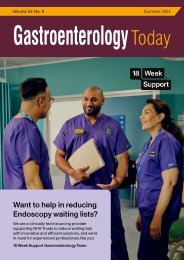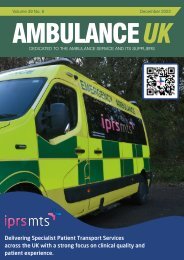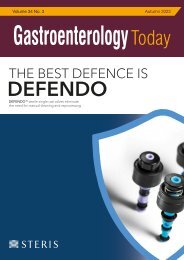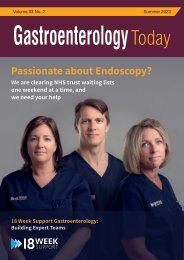Gastroenterology Today Summer 2022
Gastroenterology Today Summer 2022
Gastroenterology Today Summer 2022
Create successful ePaper yourself
Turn your PDF publications into a flip-book with our unique Google optimized e-Paper software.
FEATURE<br />
GLUTEN-FREE DIET OFFERS AN<br />
EFFECTIVE OPTION FOR THOSE WITH<br />
IBS TO MANAGE THEIR SYMPTOMS<br />
New research from the Sheffield <strong>Gastroenterology</strong> group has<br />
found that a gluten-free diet offers an equally effective dietary<br />
treatment option for those with irritable bowel syndrome (IBS)<br />
looking to manage their symptoms, alongside first and secondline<br />
dietary advice currently recommended.<br />
In the largest multicentre study of its kind, researchers investigated the<br />
long-term use of the low-FODMAP diet, the recommended second-line<br />
dietary treatment option, amongst IBS patients originally advised on the<br />
diet by dietitians based in 5 key UK hospitals 1 . The study found that the<br />
low FODMAP diet had longevity and continued success for the majority<br />
of patients with 76% continuing to follow a personalised form of the diet<br />
up to 8 years later.<br />
A key insight from the study was that 68% of these patients who<br />
reported to be following a personalised low FODMAP diet in the long<br />
term, regularly purchased specialist gluten and wheat-free products to<br />
help manage their symptoms. This led researchers to question whether<br />
the gluten-free diet may in fact be a simpler route to the same benefit<br />
and whether the gluten-free diet is in fact the crux of the ‘personalised’<br />
low FODMAP diet, which has the potential to benefit a large percentage<br />
of IBS sufferers. This ‘FODMAP light’ or ‘FODMAP gentle’ approach<br />
could provide an alternative ‘bottom up’ management approach for IBS<br />
alongside the existing ‘top down’ low FODMAP diet (see fig. 1).<br />
IBS (see fig. 2). Whilst traditional advice was found to be more patient<br />
friendly, and so should remain the first-line dietary treatment option, the<br />
low FODMAP diet and gluten-free diet should be considered as equally<br />
effective second-line alternatives, based on patient preference and<br />
specialist opinion. These findings are of particular relevance, given that<br />
an earlier piece of research from the same team demonstrated inequity<br />
in GI dietetic service provision across England, with regional differences<br />
in the level of provision and extent of specialist care and insufficient time<br />
for clinic appointments 3 . Given these findings, there is an urgent need to<br />
consider less complex dietary interventions for common conditions such<br />
as IBS in order to maximise efficiency and standards in patient care.<br />
Dr Imran Aziz, Consultant<br />
Gastroenterologist at the Royal<br />
Hallamshire Hospital, Sheffield<br />
commented:<br />
“Diet appears to play a pivotal<br />
role in symptom generation in IBS<br />
patients. Over the last decade<br />
there has been a substantial<br />
increase in interest in the role of<br />
dietary therapies in IBS, including<br />
a gluten-free diet. This latest<br />
research shows that a glutenfree<br />
has a similar level of efficacy<br />
Fig. 2<br />
to traditional dietary and low<br />
FODMAP dietary advice and so deserves a seat at the table. It is an<br />
important step in providing IBS patients with choice, helping them to find<br />
relief from their symptoms in the simplest, most effective way for them.”<br />
GASTROENTEROLOGY TODAY - SUMMER <strong>2022</strong><br />
Fig. 1<br />
A follow-up randomised trial, led by the Sheffield team involved a headto-head<br />
investigation looking at the best treatment options for patients<br />
with IBS in real world conditions 2 . It compared traditional (first-line)<br />
dietary advice, a low FODMAP diet and a gluten-free diet.<br />
The key finding from the study was that all three diets were equally<br />
effective in managing symptoms for patients with non-constipated<br />
Katie Kennedy, Company Dietitian for gluten-free food manufacturer Dr<br />
Schär who helped to fund this research, added:<br />
“Dr Schär were delighted to support Sheffield to conduct this research, the<br />
first study of it’s kind to compare all three major dietary interventions for<br />
IBS. The results will empower dietitians to suggest the most appropriate<br />
dietary treatment options for their IBS patients in a joint decision-making<br />
process. This study proves that, if advised on and followed correctly,<br />
traditional dietary advice can help the majority of IBS sufferers to find relief<br />
from their symptoms, without the need for more complex and costly dietary<br />
interventions. If traditional dietary advice fails, then there are further, equally<br />
effective options available to patients, including a gluten-free diet”.<br />
Further research is underway to build on these findings and provide<br />
further impetus for a medical consensus and future change in national<br />
guidance on IBS.<br />
6<br />
References<br />
1. Rej, A, Shaw C, Buckle R et al. The low FODMAP diet for IBS: A multicentre UK study assessing long-term followup.<br />
Dig Liver Dis 2021 Nov;53(11):1404-1411. Doi: 10.1016/j.dld.2021.05.004.Epub 2021 Jun 1<br />
2. Rej A, Sanders DS, Shaw CC, et al. Efficacy and Acceptability of Dietary Therapies in Non-Constipated Irritable<br />
Bowel Syndrome: A Randomized Trial of Traditional Dietary Advice, the Low FODMAP Diet and the Gluten-Free<br />
Diet. Clin Gastroenterol Hepatol. <strong>2022</strong> Feb 28: S1542-3565 (22) 00202-6. doi: 10.1016/j.cgh.<strong>2022</strong>.02.045.<br />
Online ahead of print<br />
3. Rej A, Buckle RL, Shaw CC, et al. National survey evaluating the provision of gastroenterology dietetic services in<br />
England. Frontline <strong>Gastroenterology</strong> 2020:flgastro-2020-101493.

















